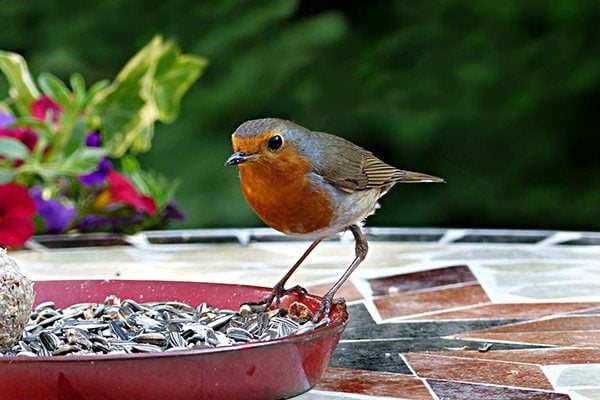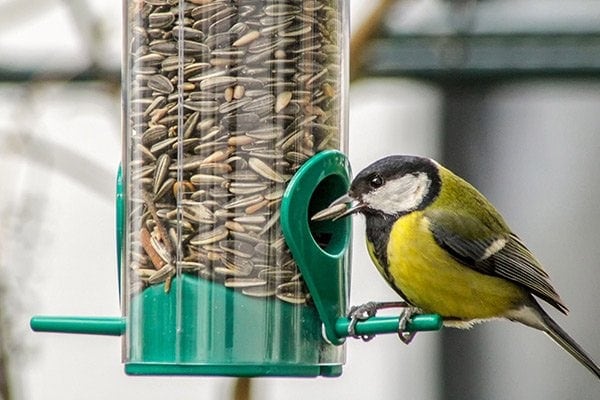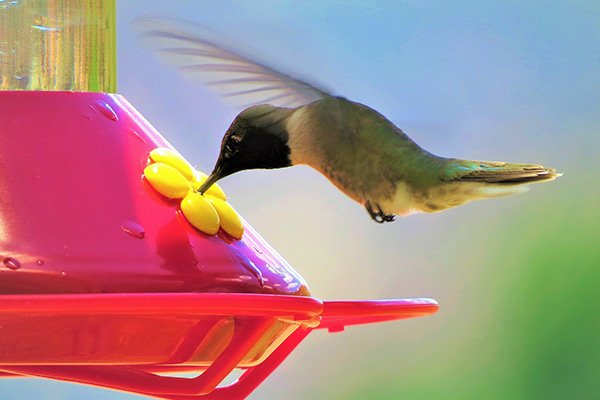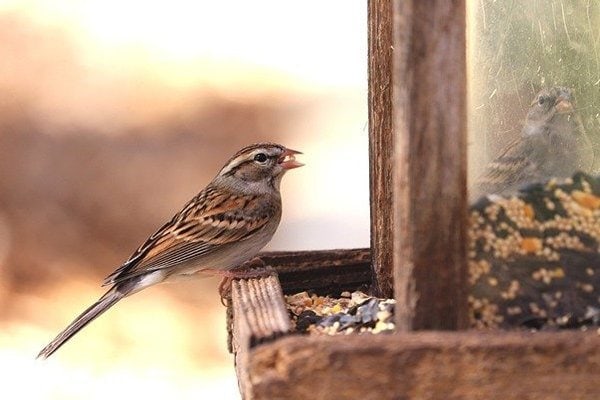Picture this: It’s a beautiful spring day. There’s a gentle breeze flowing through your backyard and the world seems peaceful.
Guess what?
As you sit down at your patio table to enjoy a cup of freshly brewed Arabica coffee, two American finches swoop down and land on a tree branch only a few feet away.
You feel like you’re living in paradise.
Life wasn’t always this majestic. You didn’t always have so many gorgeous wild birds visiting your backyard.
But your efforts to create an attractive outdoor aviary have paid off.
And now, because you’ve added some bird feeders and the best wild bird food including oil sunflower seeds, cracked corn, striped sunflower seeds, and other different types of seeds; these birds are visiting in droves.
Here’s the deal:
Some of you reading this haven’t created the backyard wild bird seed utopia described above.
Don’t worry.
It isn’t 100% necessary. But if you love bird watching it’s certainly fun!
Even so, you can still attract a wide range of backyard birds. Just place a selection of bird feeders and a variety of wild bird food options throughout your backyard.
Before long, different types of birds will notice your mix of milo seeds and sunflower seeds and instantly stop by to fill their bellies.
Why?
Because they’re hungry and you’re willing to feed them.
Does this make sense?
Now:
You might be thinking, “Where do I begin?”
Or…
“What’s the best wild bird food for my backyard?”
Again, have no fear because I’m here to help.
Keep reading to discover everything you need to know about what these birds eat.
Bird Seed & Wild Bird Food
Wild birds like it when they receive tasty meals and treats from their human neighbors! They love to eat and can’t wait to chow down on your feeding products.
To attract a variety of popular backyard birds, consider sharing the following best types of bird seed and wild bird food…
Birds that like Black Oil Sunflower Seeds are:
- Chickadees, Blue Jays, Juncos, Woodpeckers, Grosbeaks, Buntings, Doves, Cardinals, Siskins, Finches, Woodpeckers, Nuthatches, Sparrows, Towhees, and Titmice
Popular birds that like Striped Sunflower Seeds are:
- Chickadees, Juncos, Grosbeaks, Woodpeckers, Doves, Cardinals, Finches Nuthatches, Titmice, and Sparrows
Wild birds that like Cracked Corn are:
- Blue Jays, Juncos, Woodpeckers, Grosbeaks, Buntings, Doves, Cardinals, Finches, Sparrows, Towhees, and Nuthatches
Birds that want to eat great tasting Safflower Seeds include:
- Chickadees, Blue Jays, Juncos, Doves, Cardinals, Siskins, Finches, Woodpeckers, Nuthatches, Grosbeaks, and Sparrows
Birds that appreciate the always-popular Nyjer Seeds from the Wild Bird Feeding Institute are:
- Chickadees, Juncos, Buntings, Doves, Cardinals, Siskins, Finches, Woodpeckers, Sparrows, and Titmice
Birds that like Sunflower Hearts & Chips are:
- Chickadees, Blue Jays, Juncos, Woodpeckers, Grosbeaks, Buntings, Doves, Cardinals, Siskins, Finches, Nuthatches, Sparrows, Towhees, and Titmice
Birds that enjoy Peanuts include:
- Chickadees, Blue Jays, Juncos, Woodpeckers, Grosbeaks, Buntings, Cardinals, Siskins, Finches, Nuthatches, Towhees, and Titmice
Birds that love the great delicacy of Mealworms are:
- Bluebirds, Cardinals, Chickadees, Grosbeaks, Mockingbirds, Nuthatches, Orioles, Robins, Tanagers, Woodpeckers, and Wrens
Birds that need the health benefits of tasty Suet to live include:
- Bluebirds, Catbirds, Chickadees, Grosbeaks, Orioles, Nuthatches, Robins, Thrushes, Titmice, Woodpeckers, and Wrens
Best Wild Bird Food
It’s true:
In order to attract amazing birds that you love and need to see, you must offer them good food to convince them to stay in your yard.
Offering loaves of white bread and other processed junk is like giving them poison.
Please don’t do it!
To keep different types of backyard birds healthy and coming back for more, you need to deliver the goods with great tasting wild bird food.
Buy it by the small bag, or purchase it in bulk. Just buy the good stuff!
My favorite choices – based on research, personal experience, and the experiences of other happy customers – are as follows…
Top Choice: Wagner’s Greatest Variety Blend
Here’s the thing:
You want a wide range of birds visiting your backyard, right?
Your best bet to attract them is with the right bird food.
That’s where Wagner’s Greatest Variety Blend comes into the picture.
This blend is my personal top choice because so many different birds love this formula because of the variety of ingredients.
This formula contains:
Black oil seeds, canary seeds, cracked corn, peanut kernels, red milo, striped sunflower seeds, safflower seeds, Nyjer, sunflower chips, red millet, and white millet.
With such a wide range, it’s no wonder birds love eating this formula.
And the best part? It’s available at an affordable price.
Birds Attracted to Wagner’s Great Variety Blend
- Juncos
- Titmice
- Chickadees
- Finches
- Jays
- Cardinals
- Woodpeckers
- Sparrows
Quick Glance
Biggest Benefits
- This mixed blend bird food provides a wide variety for a plentiful number of birds. It’s great tasting food that they enjoy eating.
- The ingredients in this formula were carefully selected and free of fillers to ensure maximum taste and satisfaction. It’s filled with striped sunflower seeds, black sunflower seeds, sunflower chips, and an assortment of other tasty treats.
- The formula contains unshelled and hulled seeds, which can attract a wide variety of birds. These seeds and treats are available in a number of different shapes and sizes to keep birds healthy and strong.
- This formula is ideal for a wide range of birdfeeder items including platform feeders, hopper feeders, and tube feeders.
- Perching songbirds and ground feeders also find this recipe appealing.
Top Disadvantages
- Because of the wide range of varying seeds and treats for numerous birds, this wild bird food costs a higher price than other brands.
- Contains more white and red millet over other ingredients.
Runner Up: Kaytee Safflower Seed Wild Bird Food
My next favorite choice is Kaytee Safflower Seed.
Why?
Like Wagner’s Great Variety Blend, this seed contains high oil content. This is very attractive to cardinals, which happen to be my favorite bird.
But besides that…
The high oil content is also popular with a wide range of other birds that will feel highly motivated to visit your backyard.
Although I didn’t select this blend as the best bird food, I definitely feel it’s the runner-up nonetheless because many backyard birds use this formula.
Even more interesting…
It has a bitter taste. So, when some of this bird seed inevitably falls out of the birdfeeder, it isn’t going to attract squirrels, rodents, or other ground vermin.
Moving on…
Birds Attracted to Kaytee Safflower Seed Wild Bird Food
- Cardinals
- Chickadees
- Nuthatches
- Grosbeaks
- Blue Jays
- Woodpeckers
- Finches
- Buntings
- Doves
- Titmice
Quick Glance
Biggest Benefits
- Backyard birds express strong desires during feeding since they devour bitter yet tasty bird seed.
- Many appealing birds including grosbeaks, chickadees, nuthatches, and cardinals love this seed so much.
- It’s the perfect bird seed for feeder products that are particularly susceptible to squirrels. Since squirrels do not like the bitter taste, they will avoid this bird seed at all costs and leave your low hanging feeder alone.
- These seeds contain a plentiful amount of high oil content. This content is healthy, nutritious, and tastes great to a wide range of birds both big and small.
Top Disadvantages
- This formula contains messy shells. They often drop under the birdfeeder and need to get cleaned up. Most small animals avoid the bitter taste, so they do not eat the shells that fall on the ground.
- This one doesn’t appeal to as many birds as a varying blend.
Best Value: Wild Delight Deck, Porch N’ Patio Wild Bird Food
Although it isn’t the least expensive wild bird seed on the list, it’s still the best value to purchase in my opinion.
Why?
A 5-pound bag costs less than $20. And a 20-pound bag costs less than $50.
But besides the cheap price point, this one is a great choice for avid birdwatchers looking to catch more than a glimpse of the gorgeous native birds that peruse their yard.
This formula is made up of a food blend that doesn’t contain any fillers or hulls. So, not only is it tasty, it also provides a healthy feeding experience for your fine feathered friends.
Even better…
This clean formula is designed to attract birds to all of your favorite outdoor living spaces, whether you know it or not.
You can place it in a feeder on your porch, patio, or deck and the neighborhood birds will swarm whenever they crave a quick bite to eat.
Birds Attracted to Wild Delight Deck, Porch N ‘Patio Wild Bird Food
- Jays
- Grosbeaks
- Cardinals
- Nuthatches
- Finches
- Other songbirds
Quick Glance
Biggest Benefits
- The main ingredients include pistachios, sunflower kernels, whole pumpkin seeds, and peanuts. Many small songbirds love these ingredients. They’ll enjoy devouring them in your front or backyard.
- Guaranteed formulation: this guarantee means Wild Delight will always fill every bag to the brim with the same formula of this ultimate seed blend.
- The formulation is fortified with amino acids, electrolytes, minerals, and essential vitamins. These ingredients are critical to the health and well-being of outdoor birds.
- Songbirds are particularly attracted to this formula. You’ll have Blue Jays, Cardinals and Nuthatches swarming your bird feeders in no time flat.
Top Disadvantages
- Although it isn’t the most expensive on the market, some people find the price point on the higher side.
Best For Winter: Wagner’s 100% Black Oil Sunflower Seeds
A wild bird needs to eat all year round. But they’re particularly susceptible to running out of food during the winter.
Providing them with ample nutrition and hearty bird seed during the cold and frozen winter months is an excellent way to keep these birds healthy and happy.
The best way to accomplish this…
Black oil sunflower seeds!
Wagner’s offers a 100% pure sunflower seed of a complete gourmet variety.
Not only is it tasty and nutritious, but it’s also high in energy and it contains bird feed of the highest quality.
And even better?
It’s very inexpensive to purchase.
In fact, you can get your hands on a 2-pound bag for about six bucks. Or, you can go all out and buy a bigger bag and spend less per pound, which is a more popular choice.
Many Amazon Prime customers will even receive their shipping for free!
Who doesn’t love free? I sure as heck know that I’m a big fan of acquiring free stuff.
Aren’t you?
Birds Attracted to Wagner’s 100% Black Oil Sunflower Seed
- Nuthatches
- Cardinals
- Woodpeckers
- Finches
- Chickadees
Quick Glance
Biggest Benefits
- This seed attracts many of your favorite songbirds because they really love this seed and the way it tastes.
- Easy to consume because the seeds are contained in thin shells.
- These seeds are perfect for a wide variety of bird feeders including platform feeders, shed feeders, and tube feeders.
- Black sunflower seeds contain ample energy and calories to help birds survive the long winter months.
Top Disadvantages
- The bag of black sunflower seeds will potentially contain plant stalks and leaves. Some believe this makes the price less attractive.
- These seeds attract squirrels and other ground animals because they enjoy the taste of these seeds.
Best For Summer: Lyric Sunflower Kernels
Let’s face it:
Wild birds, right? They tend to make a mess!
Most people don’t want to sweep up dropped shells during the summer. They want to attract a mix of beautiful birds flying around their yard and cleaning is the last thing they’re interested in.
That’s why I recommend Lyric Sunflower Kernels for the summer time.
The shells have already been removed from these kernels.
So, the birds acquire access to complete sunflower seed pieces and nothing more.
So, there are no messy shells to clean up at the end of the day!
Birds Attracted to Lyric Sunflower Kernels
- Chickadees
- Cardinals
- Woodpeckers
- Buntings
- Grosbeaks
- Flickers
- Finches
Quick Glance
Biggest Benefits
- Made with high quality sunflower kernels carefully cleaned and selected.
- The package doesn’t contain any seeds or shells. It is 100% edible kernels.
- This formula doesn’t contain shells so it’s less messy and less wasteful.
- It’s a wholesome food filled with the levels of fat and protein to keep the customer and birds happy.
Top Disadvantages
- Sunflower kernels tend to spoil easily when they’re soaked with water.
- Squirrels particularly find them tasty and attractive.
What To Look For When Buying Wild Bird Food & Seed
Get this:
Beautiful birds visit your backyard all the time. They’re hungry and in need of proper nourishment.
Are you prepared to feed them?
Or are you going to ignore their hungry desires?
More than likely, you’re the compassionate sort. Not only do you want these birds to live long and healthy lives, but you’d also like to enjoy their presence in your backyard too.
So, when buying food for a wild bird, consider focusing on the following areas:
- Seed types and blends – does your neighborhood have an abundance of certain types of birds? You’ll want to focus on seed blends, seeds, and mix proportions that are ideal for the flying creatures in your area. Choose more popular mixes and blends to acquire the highest quality ingredients. Avoid blends with lots of cracked corn, milo, and other fillers.
- Shipping – most people focus on free shipping. This is a smart idea because it helps cut down on your costs. Plus, you may already have an Amazon Prime account for products, which makes your shipping 100% free all the time.
- Quantity/Bulk Buying – bird lovers have no trouble purchasing seeds in bulk. It makes sense to buy larger bags because it cuts down on your costs over the long run. Plus, you’ll have plenty of seed available to feed the many wonderful birds visiting your outdoor aviary.
- Freshness – always look for the freshest seeds possible when purchasing birdseed. Fresh options will not contain empty hulls, lots of unnecessary dust, or debris that isn’t quite edible. Look closer at the seeds to see if it’s infested with insects, mildew, mold, feces, worms, or moths.
- Price – undoubtedly, it would be great if you can get your bird seed for free. But like everything else in life, feeding small birds costs some money. Buying these items doesn’t necessarily have to be very expensive though. You can save money by buying in bulk, waiting for sales, or using discount and coupon codes provided by your favorite online retailers.
- Ingredients – make it a point to choose the best bird delicacies made from the highest quality ingredients. Avoid companies that treat their seeds with toxic chemicals like insecticides or pesticides.
How To Choose The Right Bird Seed For Your Bird Feeder

Now that we’ve thoroughly discussed different types of wild bird food, it’s time to consider bird feeder products and the foods that match up with them.
Not all bird feeders are created equally.
Really?
As you can imagine, some feeders are ideal for certain types of food, while other feeders are great choices for foods of different varieties.
You wouldn’t put safflower seeds in a mealworm feeder, right?
That would defeat the point and you’d end up wasting your money and feed.
Just know that using the right bird feeding device will save time, money, and it will even save your bird seeds from going to waste.
Some feeders to consider include:
Tube Feeder

Do you currently own a tube feeder? Or do you want one enough that you plan on buying one soon?
This feeder is perfect for thistle or Nyjer seeds, pumpkin seeds, nut hearts, or nuts. And let’s not forget about the black oil seeds, because they’re also a great fit.
Platform Feeder
Platform feeder products have good and bad features.
You see, some negative features include:
- The bird food is exposed to the elements like snow, sleet, and rain, and it isn’t protected.
- The tray is wide open, meaning squirrels and other ground animals can easily get to the bird seed as well.
On the other hand, this is a very appealing bird feeder for sparrows, starlings, grosbeaks, and other seed eating birds.
You can fill your platform feeder with nearly any type of bird seed. Some excellent options include safflower seeds, thistle seeds, sunflower seeds, mealworms, suet, cracked corn, and other tasty options.
Suet Feeder
This is fairly self-explanatory.
Bird loving aficionados looking to attract woodpeckers, nuthatches, warblers, titmice, wrens, and jays to their backyard will appreciate suet feeders.
These feeders are designed to accommodate one specific type of food known as suet.
The popularity of suet feeders has risen throughout the years. Birders recognize the benefits of feeding their fine feathered friends these tasty treats that have loads of energy and healthy animal fat.
Hummingbird Feeder

Guess what?
This feeder is specifically designed to feed hummingbirds.
What do hummingbirds eat? (HINT: check out our live cams to view them eating)
They love nectar!
So, you’ll want to fill your hummingbird feeder with tasty nectar. You can buy it in the store or make your own nectar at home.
Other options include fruit juice, pollen, sugar water, and tree sap if you can find some.
Hummingbirds also enjoy feasting on insects.
Peanut Feeder
A peanut feeder is perfect for the birds in your area that like munching on peanuts.
This feeder is made up of wire coils and it’s typically found in the shape of a tube.
Occasionally, you may even find a peanut bird feeder in the shape of a wreath.
The feeder consists of large holes that make it easy for the birds to pull the shelled or unshelled peanuts free.
Squirrels will occasionally attempt to steal the peanuts free from this feeder and they may succeed from time to time.
Typically, though, you’ll attract woodpeckers, blue jays, titmice, and nuthatches and other related types.
Nyjer Feeder
Are you in love with American goldfinches?
If you answered yes, then you’ll need to install a Nyjer feeder in your backyard ASAP!
American goldfinches love these tiny black thistle seeds. They can’t get enough of them and they’ll swarm to your backyard to get these tasty treats in their beaks.
Since these tiny seeds are so small, you need a special feeder that’s tube shaped. That’s where the Nyjer feeder comes in handy because it’s specifically designed using metal mesh.
This feeder can accommodate dozens of American goldfinches at one time!
Hopper Feeder

Why hang up a hopper feeder in your backyard?
It’s the perfect receptacle for a wide range of related types of bird seeds.
With this feeder, you can add the following seed products:
- Black oil seeds
- Mixed seeds
- Safflower seeds
- Sunflower seeds
Mealworm Feeder
If you like insect eating birds like bluebirds, you’ll love to get your hands on a mealworm feeder. These types of feeders are ideal because they attract thrushes, wrens, and other beautiful winged creatures as well.
Obviously, the only type of feed you’ll use in this feeder is mealworm.
Anything else would be a real waste of time.
Wild Bird Food FAQs
I get it…
Finding the right wild bird food can seem like a real hassle when you’re brand-new to this hobby.
But it’s worth pursuing nonetheless.
You’ll love seeing the beautiful birds congregate in the front of your house or near your bird feeders in the backyard.
You undoubtedly have questions. I happen to have some answers.
Seems like a match made in heaven to me, right?
What can you feed a wild bird?
At this stage of the game…
… You’re undoubtedly wondering, “What can I feed to a wild bird?”
The answer is relatively straightforward.
These birds eat a wide array of different types of food.
Some of the most popular wild bird food options include:
- Black sunflower seeds
- Traditional sunflower seeds
- Safflower seeds
- Nyjer seeds
- Peanuts
- Suet
- Millet
- Mealworms
- Cracked corn
- Milo
- Striped sunflower seeds
- and other tasty options
Which wild bird food is best?
At this stage of the game, I believe I thoroughly answered this question above.
But to reiterate my top findings, the best wild bird food options include the following:
- #1 Choice – Wagner’s Greatest Variety Blend
- Runner-up – Kaytee Safflower Seed
- Inexpensive – Wild Delight Deck, Porch N’ Patio
- Winter Formula – Wagner’s 100% Black Oil Sunflower Seeds
- Summer Formula – Lyric Sunflower Kernels
What is a bird’s favorite food?
It shouldn’t surprise anyone to know that outdoor birds definitely have their favorite foods just like anyone else.
Bluebirds love mealworms, as an example.
Yet, other birds like hummingbirds love to suck on nectar.
It all comes down to the bird and his or her particular favorite food choices.
Some of the most common birds you’ll typically find in the wild (and their favorite meals) include the following:
- Crows – suet, peanuts, and meat scraps
- Cardinals – safflower and sunflower seeds
- Buntings – safflower and sunflower seeds
- Grosbeaks – safflower and sunflower seeds
- Starlings – suet, Milo, and corn
- American goldfinches – Nyjer seed and thistle
- Bluebirds – mealworms, suet, and berries
- Thrashers – fruit, nuts, sunflower seeds, and suet
- Wrens – suet and apples
- Nuthatches – suet, nuts, corn, and sunflower seeds
- Chickadees – sunflower seeds, peanut kernels, and suet
- Titmice – sunflower seeds, peanut kernels, and suet
- Woodpeckers – insects, suet, nuts, sunflower seeds, sugar water, and fruit
- Jays – peanuts and peanut kernels, sunflower seeds, corn, and suet
- Doves – millet, sunflower seeds, nuts, thistle, cracked corn, and Milo
- Robins – mealworms, suet, berries, nut meal, raisins, and currants
What are black oil sunflower seeds?
Typically…
This seed differs from traditional sunflower seeds because it contains a thinner shell and much higher oil content than regular seeds or striped sunflower seeds.
These seeds have a lot more meat on them.
And:
Because the shells are thinner, it’s the right choice for smaller birds. Their tiny beaks can actually crack the shells and get to the tasty oily goodness on the inside.
From a nutritional standpoint, these black oil seeds are a great choice for birds because of their healthy components.
This seed is made up of the following healthy nutrients:
- Vitamins A and B
- Vitamin E
- Calcium
- Potassium
- Protein = 15%
- Fiber = 25%
- Fat = 28%
- Iron
And because of these healthy ingredients, many of the best birds prefer eating these healthy seeds.
As a matter of fact, you’ll typically find siskins, goldfinches, house finches, grackles, grosbeaks, mourning doves, cardinals, titmice, catbirds, thrushes, and many other birds gravitating toward these wonderful black oil seeds.
It’s easy to feed these sunflower seeds to birds too.
Are you willing to invest a small amount of money to purchase one or more items?
You can feed these oily sunflower seeds to birds using items including tray feeders, platform feeders, or hopper feeders. Any of these items works and they’re all great choices.
The post Wild Bird Food: What Exactly Do Wild Birds Like To Eat? appeared first on BirdInformer.com.
from BirdInformer.com https://ift.tt/3mXsGIw

No comments:
Post a Comment